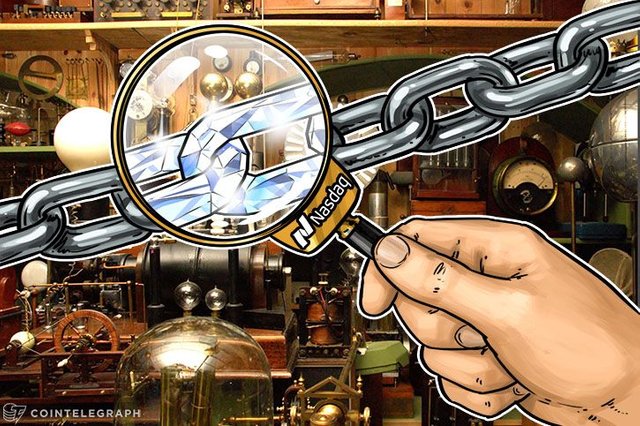
Given the meteoric rise in popularity of cryptocurrencies in 2017, some mainstream financial institutions are clamoring to board the steadily moving crypto train.
The successful launch of Bitcoin futures contracts on CBOE and CME markets has proven that there is a healthy appetite for Wall Street investors to hedge their bets on the daily trade movements of cryptocurrencies.
While the two Chicago-based exchanges will go down in history as the first to offer futures, a number of big players aren’t far behind.
The New York Stock Exchange has officially filed for permission to launch Bitcoin exchange traded funds linked to the CME and CBOE listed futures, and the likes of Goldman Sachs are planning to launch their own cryptocurrency trading desk.
Let’s not forget about the NASDAQ, which is expected to launch its own Bitcoin futures midway through 2018.
While the experts iron out the fine print of their plans to offer Bitcoin futures on their futures platform, NASDAQ shared some important facets of the underlying technology that breathes life into cryptocurrencies - the Blockchain.
Blockchain 101
For the uninitiated, we should take a quick glance at Bitcoin’s Blockchain. Put simply, this particular Blockchain is an electronic accounting ledger that records every single transaction made using Bitcoin since its inception.
The ledger is shared on a worldwide network of computers, that keeps exact copies of the entire Blockchain. Batches of transactions are stored on blocks which, when full, are added to the chain - hence the word ‘Blockchain.’ Every transaction must be verified by nodes on the Blockchain before it is stored on the Blockchain.
Given this watered-down definition of Blockchain technology, its application is almost endless, as we have seen with the creation of a wide variety of cryptocurrencies.
For the NASDAQ, and other financial institutions, Blockchain application for transactions is of the utmost interest and it allows for a number of crucial functions in the financial world.
Cutting out the middleman
First and foremost, the decentralized nature of Blockchain technology rules out the need for a central body or third-party to approve and process transactions. As the Nasdaq pointed out in its article published on Due.com by Peter Daisyme, most parties act in their own interest.
“The problem, however, is that many of these ‘agents’ have misaligned incentives, in that they are all fighting for their own slice of the profit.”
By using Blockchain technology, vital information can be authorized and shared by an efficient algorithm, free from maladministration.
“Implemented at scale, we can remove the error of human bias and maintain a cleaner, more accurate transactional databases.”
Proving ownership
Ethereum first introduced smart contracts with its Blockchain, which effectively allow contractual parameters to be added to transactions or shared information.
Smart contracts were created to ensure credible, transparent contractual obligations using Blockchain technology, effectively ensuring contractual obligations are met by both parties for the rest of the world to see.
NASDAQ highlights TrustToken’s smart contract Blockchain application, which provides a legal protocol for asset ownership.
More secure
While it’s enormously difficult to completely negate the threat of hacking, Blockchain technology has made a significant step in the right direction in negating the threat of cyber attacks.
Given that the Blockchain must be verified by nodes on the network, which is comprised of millions of computers around the world, it's virtually impossible to hack a Blockchain. Making changes to a single node is ineffectual, as the rest of the Blockchain will simply remove the node and its non-compliant record of the ledger.
Even if a hacker could destroy or affect every node of a Blockchain, the data is cryptographically encrypted. While every transaction is universally viewable, the information is unchangeable.
Quoting SteelKiwi from Hackernoon, the Nasdaq highlight just how difficult the technology is to crack.
“Unless the hacker could simultaneously bring down an entire network (which is near impossible), undamaged computers, also known as “nodes,” would continue running to verify and keep a record of all the data on the network.”
Overhauling supply chain
Another big factor for big businesses is the application of Blockchain technology in supply chain management.
Traditional methods would see long paper trails accounting for complex business activities. From finances to tracking and placing orders for raw materials, a lot can go wrong during this process.
Multinational fast moving consumer goods giant Unilever is looking to implement its own in-house Blockchain technology to streamline the supply chain management of tea production in Malawi.
The corporation plans to use Blockchain technology to manage transactions within its tea supply-chain, which could include up to 10000 farmers.
Possibilities are endless
As Daisyme points out in his analysis, the applications of Blockchain technology are endless. It simply takes bright minds looking for simple, electronic solutions to real-world problems to breathe life into the next Blockchain application.
Source Page: https://cointelegraph.com/news/blockchain-applications-for-all-walks-of-life
All future is on Blockchain.nice article.
Downvoting a post can decrease pending rewards and make it less visible. Common reasons:
Submit
Thanks Kamlesh!
Downvoting a post can decrease pending rewards and make it less visible. Common reasons:
Submit
Hi! I am a robot. I just upvoted you! I found similar content that readers might be interested in:
https://futureblock.io/2018/01/10/blockchain-applications-for-all-walks-of-life-news/
Downvoting a post can decrease pending rewards and make it less visible. Common reasons:
Submit